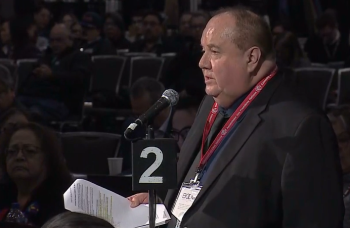Image Caption
Summary
Local Journalism Initiative Reporter
Windspeaker.com
Chiefs at last week’s Assembly of First Nations special chiefs assembly passed three resolutions—one an emergency resolution—to impress upon the federal government that it needs to obtain free, prior and informed consent from First Nations on any legislation or administrative measures that may impact them and their rights.
At the heart of the discussion were Bills S-14, an act to amend the Canada National Parks Act, and C-53, an act to recognize Métis governments in Alberta, Saskatchewan and Ontario.
“We are introducing this (emergency) resolution to demand Canada stop giving away our inherent rights as the First Nations to new groups who falsely claim to be Indigenous nations,” said Sheshatshiu Innu First Nation Chief Etienne Rich.
Rich moved the emergency resolution entitled Urgent protection of First Nations inherent and treaty rights from ongoing illegitimate rights assertions.
He accused Canada of being more interested in recognizing groups that haven’t existed historically than protecting First Nations that have been on the lands for thousands of years.
With Bill S-14, Rich said Canada was proposing to create “backdoor” recognition for NunatuKavut Community Council (NCC) in Labrador.
NCC is a governing organization that represents Inuit from south and central Labrador. The organization says it is committed to advocating for Sect. 35 rights and interest.
Bill S-14 included members of NCC under the definition of “traditional land users” and as such permitted them to “carry on a traditional activity on public lands” in the newly-established Akami-Uapishkᵁ–KakKasuak–Mealy Mountains National Park Reserve in Labrador.
This recognition, said Rich, comes even after Canada has “rejected NCC’s claims to have rights four times. Inuit are represented by (Inuit Tapiriit Kanatami) who represent all Inuit in Canada.”
The federal Senate amended Bill S-14 to exclude NCC as a traditional land user, but First Nations “must keep an eye on it,” said Rich.
In a statement, NCC President Todd Russell condemned the Senate for excluding NCC members. Russell said the amendment “completely disrespects the historical connection that NunatuKavut Inuit have to the lands, ice and waters within the Akami-Uapishkᵁ KakKasuak-Mealy Mountains National Park Reserve.”
Russell also accused some senators of “appear(ing) to have been influenced by defamatory and outright false statements made by the Innu Nation and the Nunatsiavut Government…”
As for Bill C-53, Rich said the Métis Nation of Ontario (MNO) was creating false Métis communities.
“Fake groups. First they came in our land and (now) they are coming for our identities. This is the next wave of colonialism,” he said.
Gull Bay First Nation Chief Wilfred King said his nation had been “vehemently” opposing Bill C-53.
Ontario First Nations are protesting six additional historic Métis communities saying MNO is claiming First Nations land and MNO’s membership list includes people whose ancestry is First Nations and not Métis.
“We even approached Indigenous Members of Parliament and senators, and it seems to me that they’re more aligned with their political party than with our rights,” said King.
He added that there were 15 federal ridings in which First Nations “hold the vote” and that MPs that were elected needed to be those who recognized and upheld First Nations interests.
R. Donald Maracle, chief at Mohawks of the Bay of Quinte, also expressed concerns about Bill C-53 as two resolutions were passed to strengthen the involvement of First Nations in Canada’s work under the United Nations Declaration on the Rights of Indigenous Peoples Act (UNDA).
Maracle said that through Bill C-53, MNO intended to get treaty rights, which would infringe upon the rights of First Nations treaty holders.
Maracle amended one of the two resolutions to call on Canada to ensure that the implementation of UNDA “does not infringe, diminish or derogate in any way from existing Sect. 35 rights.”
Maracle said he was concerned that the Act did not include a definition of “Indigenous,” which, he said, leads to a pan-Indigenous approach.
“I don't think we should be buying into this Indigenous label that they're trying to homogenize all of our rights into a common group. I think in the long run, we will be short changed,” he said.
Under Sect. 5 of UNDA, when Canada undertakes amendments to federal legislation, policy, or regulations a duty to consult is triggered.
Maracle said chiefs had not been consulted on a pan-Indigenous approach to the implementation of rights.
At the all-candidates forum Dec. 5, soon-to-become national chief Cindy Woodhouse said she didn’t like the pan-Indigenous approach or the word “Indigenous.”
“We’re not Indigenous. We’re First Nations people,” she said.
As for Bill C-53, Woodhouse said she believed all parties would pass it and that AFN needed to develop a strategy on how to lobby the Senate.
“We probably will be in court on that issue because they’re discriminating against each and every one of us again,” she said.
Bill C-53 is presently before the Standing Committee on Indigenous and Northern Affairs. The committee, comprised of members from all parties, is going through the bill clause-by-clause with officials from Crown-Indigenous Relations and legal counsel from the Department of Justice present to answer questions.

